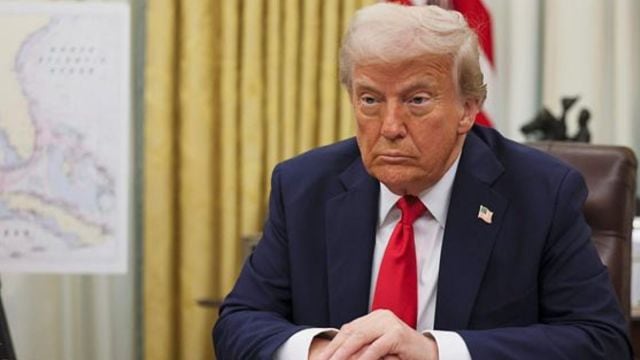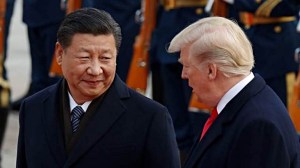From internet shutdowns to no-meat-in-dairy-feed rules: Key USTR report flags trade concerns over India before reciprocal tariffs kick in
Indicating that Washington fears another China in the making, the report stated that the US has placed India on the ‘Priority Watch List’ due to inconsistent progress on intellectual property (IP) concerns.
 The Trump administration has appealed Bredar's earlier decision, claiming the firings were lawful and the judge lacked the power to require workers to be reinstated. (AP/ PTI Photo)
The Trump administration has appealed Bredar's earlier decision, claiming the firings were lawful and the judge lacked the power to require workers to be reinstated. (AP/ PTI Photo)A day before imposing reciprocal tariffs, the United States raised a range of concerns over India’s trade practices that harm American interests. These range from “localised internet shutdowns that disrupt commercial operations” to “an Indian regulation requiring that dairy products intended for food must be derived from animals that have not consumed feed containing blood meal”.
Hinting at possible US demands in ongoing trade negotiations with India, the United States Trade Representative’s (USTR’s) new report on foreign trade barriers covering 29 major trade partners has flagged India’s regulations on the import of milk, pork, and fish products, which it said “require genetically modified-free certificates without providing a scientific or risk-based justification”.
Indicating that Washington fears another China in the making, the report stated that the US has placed India on the ‘Priority Watch List’ due to inconsistent progress on intellectual property (IP) concerns. It highlighted the lack of specific laws for “trade secret protection” as a significant issue, along with long waiting periods for patent grants.
The US has also expressed concerns over India’s price caps on coronary stents and knee implants, stating that these controls have not kept pace with inflation and do not account for production costs or innovation, potentially discouraging US companies from serving the Indian market.
US demands on dairy, agriculture and GM products
The report reiterated a long-standing American concern over India’s agricultural support programmes, which, according to the US, distort markets. However, Indian officials have argued that US subsidies for farmers are much higher compared to what India provides.
The US also raised concerns about India’s application of quantitative restrictions on imports of various pulses to manage domestic oversupply, noting the opaque and unpredictable nature of these restrictions. “Restrictions on boric acid imports, including arbitrary quantity approvals and requirements favouring domestic manufacturers, are also a concern,” the report said.
“India requires that dairy products intended for food be derived from animals that have not consumed feed containing internal organs, blood meal, or tissues of ruminant or porcine origin, and that exporting countries certify to these conditions, which lack a discernible animal health or human health justification,” the report said. The report also highlighted long standing differences between Washington and New Delhi over genetically modified (GM) products exported by the US.
“The Food Safety and Standards Act of 2006 includes specific provisions for regulating food products derived from genetically engineered (GE) products; however, as of 31 December 2024, FSSAI was still in the process of establishing its regulations. India’s biotechnology approval processes are slow, opaque, and subject to political influences, and do not appear to take into account science-based approval processes for GE products in exporting countries,” the report said.
Data localisation and digital trade barriers
The US has expressed concerns about data localisation requirements for payment service suppliers and banks. “In 2018, the Reserve Bank of India (RBI) implemented a requirement that all payment service suppliers store all information related to electronic payments by Indian citizens on servers located in India. RBI announced this rule without advance notice or input from stakeholders. In 2019, RBI stated that the requirement to store payments data locally also applied to banks operating in India. Foreign firms assert that the data storage requirement hampers the ability of service suppliers to detect fraud and ensure the security of their global networks,” the report said.
The Indian Express reported on Friday that concerns over India’s strict data localisation norms were raised by the US during the four-day negotiations that ended on Saturday.
“The United States continues to encourage India to adopt an ‘open skies’ satellite policy to allow consumers the flexibility to select the satellite capacity provider that best suits their business requirements and to promote market access for foreign satellite service providers,” the report added. Incidentally, DOGE chief Elon Musk, a confidant of President Donald Trump, is a promoter of the Starlink satellite communication provider.
Concerns over India’s patent regime
US concerns over India’s patent regime include copyright piracy, particularly online, and issues with statutory licensing. In the field of patents, long waiting periods for patent grants, excessive reporting requirements, and concerns regarding patentability criteria were noted. The report added that the US continues to monitor restrictions on patent-eligible subject matter in Section 3(d) of the Indian Patents Act.
“Concerns also exist regarding the protection of undisclosed test data and the lack of an effective mechanism for the early resolution of pharmaceutical patent disputes. Inadequate IP enforcement, delays in trademark opposition proceedings, and the lack of specific laws for trade secret protection are also significant concerns,” the report said.
Must Read
Buzzing Now
Apr 09: Latest News
- 01
- 02
- 03
- 04
- 05


























